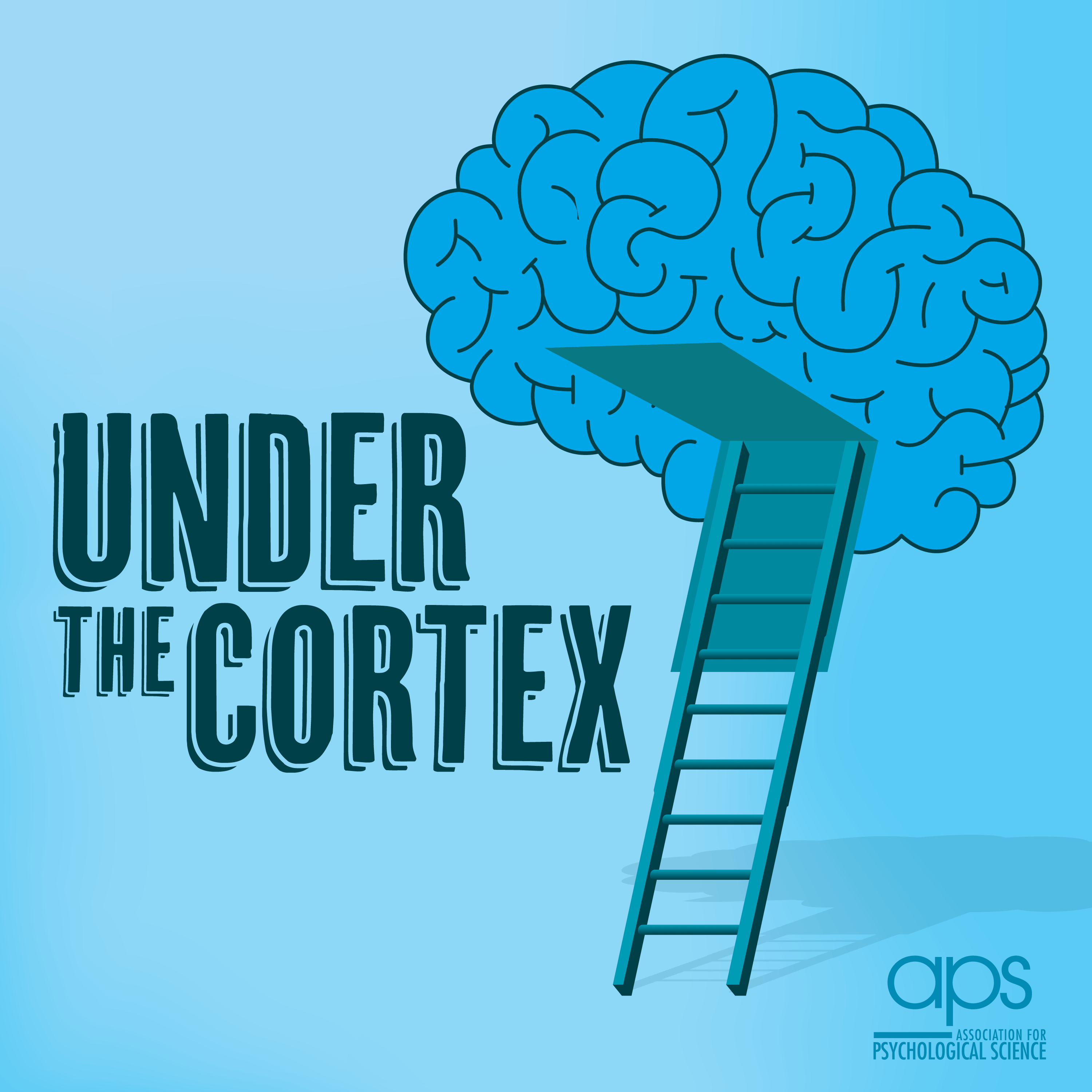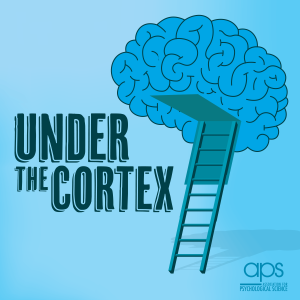
235.5K
Downloads
152
Episodes
The podcast of the Association for Psychological Science. What does science tell us about the way we think, behave, and learn about the world around us? Under the Cortex is proudly sponsored by Macmillan Learning Psychology, where captivating content meets genuine engagement. Our authors, who are seasoned educators, understand today’s teaching challenges. We aim to craft and present both information and interactive tools that truly connect with students. Whether in-person or online, we support instructors and inspire students. Macmillan Learning Psychology: Engaging Every Student, Supporting Every Instructor, Setting New Standards for Teaching and Learning.
The podcast of the Association for Psychological Science. What does science tell us about the way we think, behave, and learn about the world around us? Under the Cortex is proudly sponsored by Macmillan Learning Psychology, where captivating content meets genuine engagement. Our authors, who are seasoned educators, understand today’s teaching challenges. We aim to craft and present both information and interactive tools that truly connect with students. Whether in-person or online, we support instructors and inspire students. Macmillan Learning Psychology: Engaging Every Student, Supporting Every Instructor, Setting New Standards for Teaching and Learning.
Episodes

Thursday Oct 31, 2024
Green Actions, Brighter Lives: Enhancing Well-Being Through Environmental Action
Thursday Oct 31, 2024
Thursday Oct 31, 2024
Can environmentally friendly actions boost personal well-being? Tune in to discover how a sustainable lifestyle offers profound benefits.
In this episode, APS's Özge Gürcanlı Fischer Baum speaks with Michael Prinzing from Baylor University. Prinzing shares findings from a recent research article published in Psychological Science, which highlights the link between well-being and climate action. Together, they discussed how participants from 14 countries incorporated eco-friendly actions into daily routines and how these actions globally offer a unique path to well-being.
If you're interested in learning more about this research, visit psychologicalscience.org.
Send us your thoughts and questions at underthecortex@psychologicalscience.org

Thursday Oct 17, 2024
A New Approach to Understanding Psychopathology: Insights from the HiTOP Model
Thursday Oct 17, 2024
Thursday Oct 17, 2024
Are traditional mental health diagnoses missing the bigger picture? How can a new model help us better understand and treat mental disorders? What does recent research say about how we categorize psychopathology in youth?
In this episode, APS's Özge Gürcanlı Fischer Baum interviews Miri Forbes of Macquarie University. Together, they address how traditional models like the Diagnostic and Statistical Manual of Mental Disorders (DSM) categorize mental health disorders and explore Forbes’ recent study published in Clinical Psychological Science highlighting the more nuanced and dimensional approach that the emerging Hierarchical Taxonomy of Psychopathology (HiTOP) offers. The strengths and shortcomings of these systems, challenges of diagnosis, and evolving landscape of mental health research are discussed.
If you're interested in learning more about this research, visit psychologicalscience.org.
Send us your thoughts and questions at underthecortex@psychologicalscience.org

Thursday Oct 03, 2024
Navigating Divisive Conversations: Why We Underestimate the Benefits
Thursday Oct 03, 2024
Thursday Oct 03, 2024
Why do we shy away from discussing divisive topics like politics and religion? Are our fears of negative reactions justified or off-base?
In this episode, APS's Özge Gürcanlı Fischer Baum speaks with Kristina Wald from the Wharton School at the University of Pennsylvania. Wald shares findings from a recent research article published in Psychological Science, which shows that people often underestimate the benefits of talking about divisive topics, even with those who disagree. The conversation offers insights into why we prefer talking with those who agree with us, and how we can better approach polarized discussions.
If you're interested in learning more about this research, visit psychologicalscience.org.
Send us your thoughts and questions at underthecortex@psychologicalscience.org

Thursday Sep 19, 2024
Friendship and Diversity: A Path to Stronger Communities?
Thursday Sep 19, 2024
Thursday Sep 19, 2024
Why do we gravitate towards friends who share our background and identity? How does this affect our sense of community and well-being?
In this episode, APS's Özge Gürcanlı Fischer Baum speaks with Miguel Ramos from the University of Birmingham to discuss his recent study on social cohesion and well-being, published in Psychological Science. They dive into the concepts of homophily and heterophily, exploring how our preferences for similarity and diversity impact our social networks and overall happiness. Tune in as they discuss the implications of embracing diversity and what it means for creating stronger, more cohesive communities.
If you're interested in learning more about this research, visit psychologicalscience.org .
Send us your thoughts and questions at underthecortex@psychologicalscience.org

Thursday Sep 05, 2024
Thursday Sep 05, 2024
In this episode, Zekun Sun and Chaz Firestone from Johns Hopkins University join Under the Cortex to discuss their new paper in Psychological Science titled “Caricaturing Shapes in Visual Memory.” The conversation with APS’s Özge G. Fischer Baum reviews how our visual system uses templates and exaggerates the basic features of objects in memory. The authors describe a series of experiments that show how visual memory is more complex than previously thought and that visual details in memory are not always lost.
If you're interested in learning more about this research, visit psychologicalscience.org.
Send us your thoughts and questions at underthecortex@psychologicalscience.org.

Thursday Aug 22, 2024
Thursday Aug 22, 2024
Accurate reporting in psychological science is vital for ensuring reliable results. Are there statistical inconsistencies in scientific articles?
In this episode, APS's Özge Gürcanlı Fischer Baum speaks with Michele Nuijten from Tilburg University to examine how overlooked errors in statistical reporting can undermine the credibility of research findings. Together, they discuss Nuijten’s research published in Advances in Methods and Practices in Psychological Science and examine practical strategies to enhance the quality of psychological research.
If you're interested in learning more about this research, visit psychologicalscience.org.
Send us your thoughts and questions at underthecortex@psychologicalscience.org.

Thursday Aug 08, 2024
The Benefits of Everyday Math for Kids
Thursday Aug 08, 2024
Thursday Aug 08, 2024
APS’s Özge Gürcanlı Fischer Baum chats with Melissa Libertus from University of Pittsburgh about her new article about interventions to increase math learning in children. They discuss various strategies parents can use to reinforce the development of math skills in everyday life like at the grocery store or using board games.
If you're interested in learning more about this research, visit psychologicalscience.org.
Send us your thoughts and questions at underthecortex@psychologicalscience.org.

Thursday Jul 25, 2024
Racial Disparities in Drug Intervention: Culturally Inclusive Approaches
Thursday Jul 25, 2024
Thursday Jul 25, 2024
In this episode, APS’s Özge Gürcanlı Fischer Baum discusses culturally sensitive and inclusive treatments with experts William Stoops from the University of Kentucky Medical Center, along with his colleagues Jardin Dogan-Dixon and Danelle Stevens-Watkins from the University of Kentucky, Paris Wheeler from the University of Cincinnati, and Krystal Cunningham from Boston College.
Together, they examine evidence-based drug treatment studies, highlighting racial disparities in treatment effectiveness, especially how Black participants often experience worse outcomes than White participants. The discussion includes the impact of systemic racism, the opioid versus cocaine overdose epidemics, and the differences between culturally tailored and universal interventions.
If you're interested in learning more about this research, visit psychologicalscience.org.
Send us your thoughts and questions at underthecortex@psychologicalscience.org

Thursday Jul 11, 2024
When Versus Whether: Gender Differences in Leadership
Thursday Jul 11, 2024
Thursday Jul 11, 2024
In contemporary society, there is a significant rise in the number of women assuming leadership positions compared to past generations. Nevertheless, this raises the question: Do these growing numbers equate to equal access to opportunities? What are the common gender disparities seen in professional environments?
APS’s Özge Gürcanlı Fischer Baum chats with Hannah Bowles from Harvard Business School about her new article reviewing under what conditions differences between men and women might emerge. They discuss how ambiguity and stereotypes can function to exacerbate or minimize differences between men and women.
If you're interested in learning more about this research, visit psychologicalscience.org.
Send us your thoughts and questions at underthecortex@psychologicalscience.org

Thursday Jun 27, 2024
Tools to Bolster Executive Function Skills in Kids
Thursday Jun 27, 2024
Thursday Jun 27, 2024
In this episode, Philip Zelazo and Ellen Galinsky join Under the Cortex to discuss their new paper in Current Directions in Psychological Science titled “Fostering Executive-Function Skills and Promoting Far Transfer to Real-World Outcomes: The Importance of Life Skills and Civic Science.” The conversation with APS’s Özge G. Fischer Baum reviews the many ways executive functioning skills are used throughout daily life. The authors describe the process they used to involve the community to determine what skills they focused on in their intervention and the intervention’s success.
To learn more about this research, visit psychologicalscience.org.
Send us your thoughts and questions at underthecortex@psychologicalscience.org.
